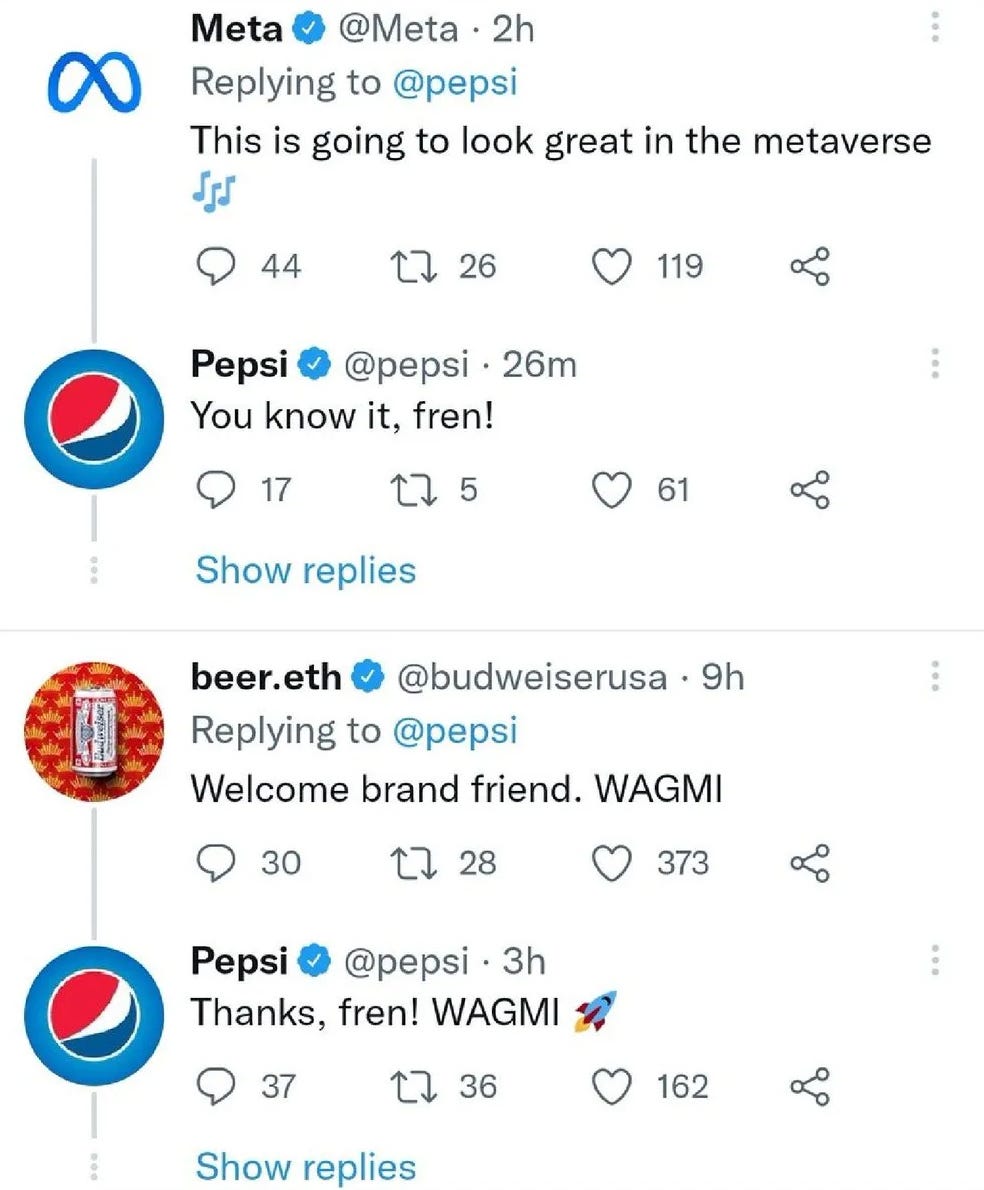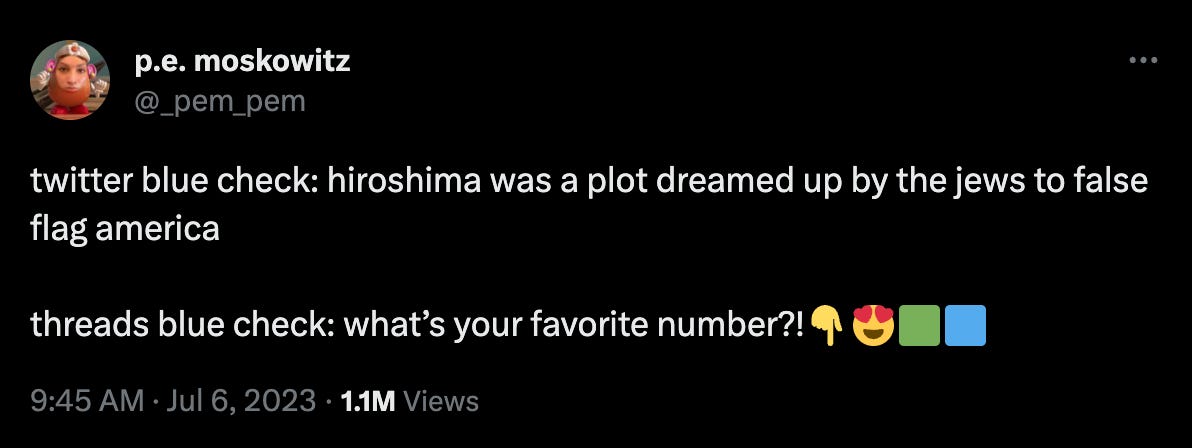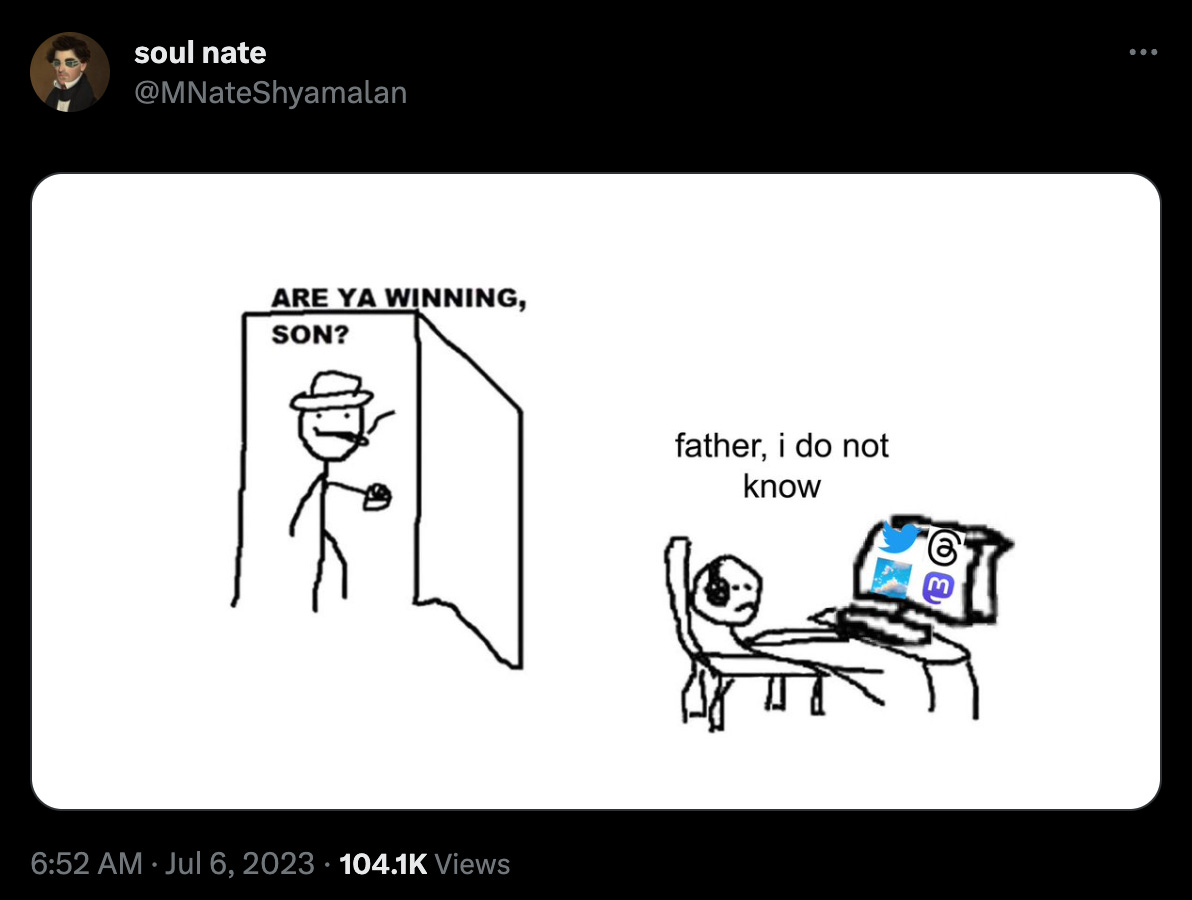Threads vs Twitter
A strange month to be a Poster.
A few weeks ago (on my birthday of all days), Meta released Threads, its Twitter clone competitor. The experience of using it has so far been... uneven. Scrolling the feed on launch day felt like being trapped in this deeply cursed Twitter thread from 2011:
Basically, a lot of brands being, well, brands. Later, it was celebrities being celebrities and posting bottom-tier thread-based puns. If you’ve spent more than six minutes online in the last decade, seeing dull content from brand accounts and famous people isn’t a surprise, but what is jarring is seeing it on day one of a new social network. Somehow a feed free of actual ads felt like it was mostly ads.
I am not the first to be alarmed by the "state of Posting" (what a sentence) on Threads. But certainly one of the most likely failure modes of the app will be if it's just really really boring. Celebrities sending really lame tweets may have been enough to propel Twitter to 100 million users in the early 2010s, but we live in the age of binge watching and TikTok now — the threshold of constant dopamine needed to keep a social network afloat is far above a post from Starbucks saying "i am coffee" at the top of your feed.
To Meta’s credit, the app doesn’t always feel like this. Each time I’ve scrolled the feed (there’s still only one) in the days since launch, it’s felt like I’ve been presented with a radically different timeline — once it was nearly all Instagram meme accounts, one time it was mostly Zuck replying to other Meta employees and talking about MMA, and a few times it was actually a feed of my [most online] friends. It also presented me with 5 posts from Hank Green in a row one time. As can be expected from any new It app, there’s frequently a lot of talking about the app on the app. One of the most telling predictors of the success of a new social network is whether the app can escape being its own main character (Clubhouse never did, Bluesky is stuck in this phase now).
But it’s harsh to expect an app that’s days old to look and feel like an exact replica of a fully mature social network with updated wallpaper. Threads grew to 100 million users in five days. Five days! No app has done that before. It’s possible that record will never be broken. Very few companies have the infrastructure to do that without toppling over (remember the period when BeReal would crash every time it was ⚠️Time to BeReal ⚠️?) And we witnessed something very novel, an at scale social network (Instagram) being used to directly bootstrap another social network. It turns out that when you have a billion users, you can do Interesting Things.
If this entire launch feels a bit like a weirdly personal billionaire side quest to you, you’re not alone. The last Interesting Thing that Zuck did was rebrand his company to reflect a unified focus on the metaverse. Twitter is certainly not the metaverse. So why is he doing this?
It’s possible we wouldn't have gotten Threads without Elon buying Twitter. We certainly wouldn’t have gotten it now. Meta quite literally pushed up the launch date because of the latest Twitter self-own, the bizarre rate-limiting fiasco of early July. And they were right to seize this moment; frustration with Twitter has never been higher. There are half a dozen “Twitter clones” that now crop up regularly in the news. Only one or two are worth trying; none will likely be relevant in a year (Maybe Bluesky, but that team feels wholly unprepared for the task they’ve signed on for, launching their public beta without basic features like blocking and moderation, often crashing whenever they receive an influx of new users, and most recently appearing baffled that people got upset when trolls started using racial slurs in their usernames. To me, they suffer from the same issue Musk does: thinking the biggest challenge of scaling social networks is the engineering, rather than the network of people). A lot of the time, Twitter itself feels like a cheap knockoff of the app it used to be — in an impressively paradoxical feat, Elon has turned Twitter into its own Twitter clone.
Eugene Wei details Twitter’s missteps brilliantly in a recent essay. He also says it’s unlikely that what replaces Twitter is just another Twitter:
It’s not clear there will ever be a Twitter replacement. If there is one, it won’t be the same. It may look the same, but it will be something else. The internet is different now, and the conditions that allowed Twitter to emerge in the first place no longer exist.
It’s also really important to remember that Twitter isn’t that big. It’s large culturally — far more than the number of users (or their ad revenue) would suggest — but only has around 200 million daily active users. Snapchat has nearly double that with over 375 million, Instagram has over 500 million, and TikTok has over 700 million. If you’re running one of the larger social networks, Twitter feels like a vulnerable target. But Twitter’s enduring (and distinct) appeal has always been how it can feel like it’s collapsing the chaos of the entire world into one feed. Wei again:
Twitter … felt like it compressed space—the timeline felt like a single lunch room hosting a series of conversations we were all participating in or eavesdropping on—and time—every tweet seemed to be uttered to us in the moment, and so much of it was about things occurring in the world at that moment … A lot of Twitter was textual, but the character limit and the ease of replying lent much of it an oral texture. It felt like a live, singular conversation.
Twitter has always been at its best when one story holds the world’s attention — when it does feel especially like one singular conversation. I vividly remember it feeling this way the weekend Trump was hospitalized with covid; the week following the ill-fated journey of the Titan submersible is a more recent example. There’s truly nothing else like it. No other social network has a “main character” nearly every day.
Zuck seems to understand this, or at least have thought about it a lot. When asked why he’s building Threads, he and his deputy Adam “Some big changes are coming to your Instagram feed” Mosseri speak about building a public square with a billion users. Even before the launch, Zuck went on the Lex Fridman podcast and said:
“For whatever reason, I feel like Twitter has not lived up to what I would have thought its full potential should be… I always thought that Twitter should have a billion people using it… The idea coupled with good execution should get there.”
To Zuck, the mission of Twitter is noble and important, but the social network has perpetually been in its own way. Jack didn’t really do much (it’s increasingly unclear whether his brain still exists in our shared reality); now Elon is doing too much. Echoing many a collegiate Marx reader, Zuck believes “real Twitter has never been tried.” Or, perhaps a bit more cynically, Zuck thinks the internet’s town square should exist, but it should also just so happen to be his, and he’s finally found his moment.
It’s clear that Zuck has the timing right, but what remains to be seen is whether the product can get there. Activity on Threads is — as expected — way down since that frenetic first weekend. But it’s lazy to call a social network dead when it isn’t yet a month old and has tens of millions of daily active users. Threads has a colossal amount of resources behind it, and one incredibly asymmetric advantage: native integration with Instagram. That’s a huge distribution channel, and makes re-engaging users a much more surmountable problem than it is on most social networks. (It’s also an escape hatch from the typical curse of early hype.)
Twitter’s product changes over the past year have been erratic, but there’s a mostly continuous trend away from more close-knit social products (RIP fleets and circles) and towards what used to be called the “creator economy” — things like subscriptions, tipping, and shared ad revenue. All of these are optimizing for the worst and 🧵-iest posters and content on the site, and none are making the app feel like a town square, or even a pleasant place to spend time.
This opening could be an easy way for Threads to gain ground. Instagram has felt directionally lost for the past few months years, but stories and close friends remain bright spots, and their absence is tangible while scrolling around on Threads. It’s likely that a lot of things were cut from the initial version when Meta moved up the launch date, but I haven’t noticed many new features or even changes in the app since its debut. A team like Meta/Instagram going all out on fun and unique experiments just for the hell of it would give Threads some much-needed energy, and also be a way for it to stand apart from the crowd of Twitter clones. I’m also curious to what extent the avoidance of politics and “hard news” is real, rather than just signaling to advertisers that this will be a brand-safe alternative to the bird app. No matter your political leanings, it feels central to a true town square that most politicians are a DM (or quote-dunk) away.
It does seem unlikely that Threads will escape mundanity with Mosseri at the helm. Network effects from Instagram may be enough to provide a steady trickle of growth, but Threads needs to be engaging in its own right to keep people there. The high-conviction bets that historically propelled other social networks to success have been strikingly absent from Mosseri’s Instagram, which has only gotten muddier and more convoluted over time. There’s an entertainment factor central to TikTok and Twitter that IG has failed to truly key into, and it’s a shame to hand a mostly blank slate to someone who seems afraid to make a mark on it. Playing it safe is likely to end with Threads in a local maximum of boredom, and Zuck killing it off after it stagnates for long enough. There is a very real moment here, but it needs to be seized.
The decline of Twitter feels like it’s left a hole in the internet. I don’t know if all of my friends have fled algorithms for group chats, but there is a palpable sense of fatigue. I spend increasingly more time clicking links in newsletters than I do on news feeds. Lately the Retro app has been a surprisingly fun and low-stakes way of keeping up to date with friends without feeling invasive or spammy. And that is a nice way to be online. But it fills a distinct space — networks of close friends aren’t the same as logging into the internet’s shared watercooler. And I probably will stay active on Twitter, at least until Musk starts charging $8/month to send a tweet (which at this point should be on everyone’s 2023 bingo card).
I do hope Threads succeeds, to the extent that I really miss what Twitter used to be and I have no lingering hopes that it will survive Musk’s tenure. (As I prepare to post this, most non-Barbenheimmer tweets on my feed are about how Elon has decided to fully delete the Twitter brand and replace it with the horrifically vapid and reeking-of-high-school “X” on a clearly doomed mission to build an “everything app.” I will never call it X.) But it’s also possible that Wei is right, that Twitter was a unique product of its time, a lot of luck, and a very particular but limited group of users. Maybe it was never going to grow beyond that — maybe the problem is us, not the technology. One more excellent (if forlorn) bit from him:
That golden era of Twitter will always be this collective hallucination we look back on with increasing nostalgia, like alumni of some cult. With the benefit of time, we’ll appreciate how unique it was while forgetting its most toxic dynamics. Twitter was the closest we’ve come to bottling oral culture in written form.
Twitter in its prime always had an edge, a coolness. Maybe you don’t reach a billion users and get to keep that. Does that make either path — the small, biting, cultural heavyweight or the large but politely dull town square — a failure? It’s hard to say. Maybe most of the internet is uncool. Maybe, no matter how or why you pull it off, whenever you get the whole internet in one room without much to do but post what they’re thinking about, it's doomed to be boring. Profitable, but boring.





